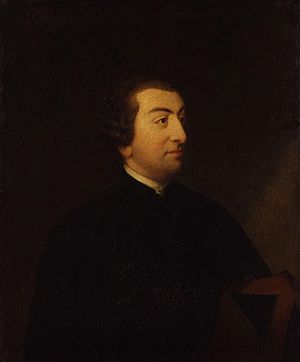Thomas Tyrwhitt facts for kids
Thomas Tyrwhitt (born March 27, 1730 – died August 15, 1786) was an English scholar and critic. He was very good at studying ancient Greek and Roman texts, as well as old English writings.
Contents
His Life Story
Thomas Tyrwhitt was born in London, England, and he also passed away there. He went to school at Eton College, which is a famous school, and then studied at Queen's College, Oxford University. Later, in 1755, he became a fellow at Merton College, Oxford.
He worked for the government for a while. In 1756, he became an under-secretary at war. Then, in 1762, he got an important job as the clerk of the House of Commons. This meant he helped manage the records and business of the British Parliament.
In 1768, he decided to leave his job. He wanted to spend the rest of his life studying and researching. He was elected a Fellow of the Royal Society in 1771, which is a big honor for scientists and scholars. In 1784, he became a trustee of the British Museum. He even gave some of his valuable books to the museum when he died.
His Important Works
Thomas Tyrwhitt was known for editing and publishing many important old texts.
Studying Ancient Texts
He worked on several classical writings:
- Fragmenta Plutarchi II. inedita (1773): These were parts of writings by an ancient Greek historian named Plutarch that hadn't been published before.
- Dissertatio de Babrio (1776): This book included some fables by Aesop that were new to scholars.
- De lapidibus (1781): This was a text about stones, which he believed came from the time of an ancient Roman emperor.
- Conjecturae in Strabonem (1783): These were his ideas and notes about the writings of Strabo, an ancient Greek geographer.
- Isaeus De Meneclis hereditate (1785): This was a text about inheritance laws from ancient Greece.
- Aristotle's Poetica (1794): This was his most important work. It was about the famous Greek philosopher Aristotle's ideas on poetry. It was published after Tyrwhitt passed away.
Chaucer and the Rowley Poems
He also did important work on English literature:
- He edited Chaucer's Canterbury Tales (1775–1778). This was a very popular collection of stories from the 14th century.
- He also looked at some poems that were supposedly written in the 15th century by someone named "Thomas Rowley." These poems were found in Bristol. At first, Tyrwhitt thought they were real and helped get them published. However, after more study, he realized they were actually forgeries. He then wrote an appendix to his book to explain that the poems were all written by a young poet named Thomas Chatterton.
Other Publications
While he was the clerk of the House of Commons, he also edited some important historical documents:
- Proceedings and Debates of the House of Commons, 1620–1621: This was a record of what happened in Parliament during those years.
- Henry Elsynge's The Manner of Holding Parliaments in England (1768): This book explained how parliaments were run in England.
Images for kids
 | DeHart Hubbard |
 | Wilma Rudolph |
 | Jesse Owens |
 | Jackie Joyner-Kersee |
 | Major Taylor |



